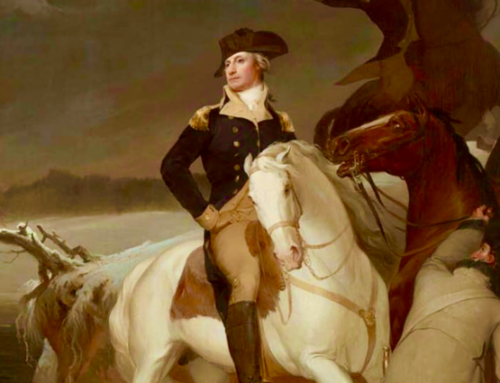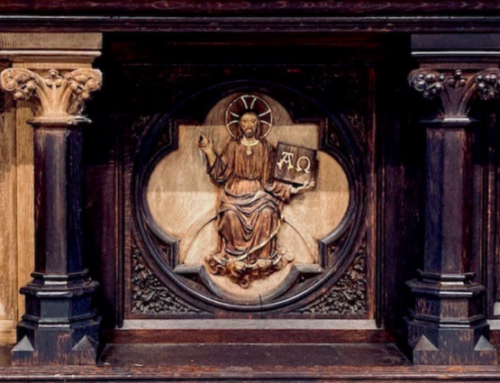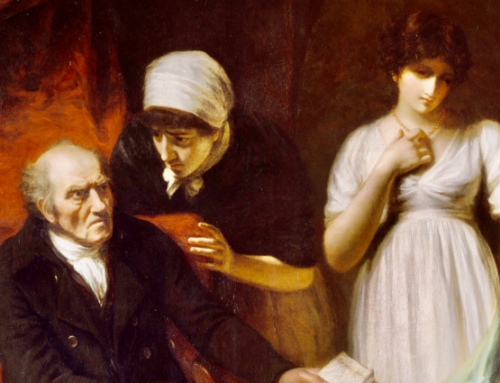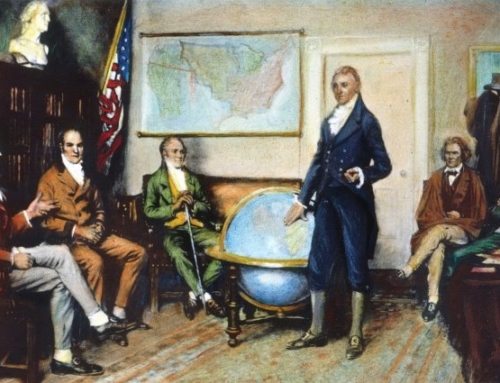The Judeo-Christian heritage of America can be felt in her sociocultural being. Our moral laws were drawn with respect to protecting our rights, and our faith inspires us to be proactive with respect for others. This is where love counts—the ultimate expression of individualism, the greatest act of human free will.
 One of the perennial criticisms leveled at the American identity is that the national sense of individualism is inconsistent with the Judeo-Christian heritage the country draws upon. Most often, this assertion is leveled by those on the political Left who have a more secular and state-centric goal in mind (they also dispute the Judeo-Christian heritage itself); but there are some elsewhere in the political spectrum who also maintain the same criticism for different reasons. Nevertheless, this is not a defensible position.
One of the perennial criticisms leveled at the American identity is that the national sense of individualism is inconsistent with the Judeo-Christian heritage the country draws upon. Most often, this assertion is leveled by those on the political Left who have a more secular and state-centric goal in mind (they also dispute the Judeo-Christian heritage itself); but there are some elsewhere in the political spectrum who also maintain the same criticism for different reasons. Nevertheless, this is not a defensible position.
Americans love and value human stories of success, redemption, and comebacks. This, too, is an integral part of the American identity, and this sense of optimism and hope for the future does indeed find its roots in a Judeo-Christian worldview. That sense of starting anew, that hope for a better future, of building something good from nothing, is rooted in religious faith in the redemption given by Christ. No matter who I am, I am redeemed and can choose His offer of salvation. In America, no matter who I am, I can choose to work hard and make something of my life. It is individual human free will. It is choice, not fate.
Massachusetts Bay Governor John Winthrop expounded that unfolding but not yet named American spirit in a speech in which, referencing the Bible, he spoke of building a city on a hill, a light to the rest of the world. They were then, as Thomas Paine later advanced the cause of those supporting the American Revolution, beginning the world all over again. Abraham Lincoln consequently referred to the United States as the last best hope of the Earth; and in a time of self-doubt, Ronald Reagan illumined that anything was possible for Americans.
The Judeo-Christian truth of free will, of self-determination, was incorporated both in the Declaration of Independence and the Constitution through the core of natural rights as self-evident truths—founded upon the understanding that those human rights naturally come from God by virtue of our individual souls and creation by His hand.
Philosopher John Locke, read widely by colonial Americans from the farmer to the Framer, wrote on such truths and rights, reasoning their existence and arguing for their practice. As C. Bradley Thompson has demonstrated in his book America’s Revolutionary Mind, Locke was decisively influential in motivating Americans to secure their rights through law. For the creation of America, the Bible provided moral truth, and Locke’s philosophy moral reasoning.
The American system is therein designed to protect the rights of the individual. This is where critics of the concept of American individualism often begin, noting that individualism is inherently selfish, and selfishness is itself an unalterable product of the American system. Because the individual has primacy, it is reasoned, all others are excluded to the one. This prevents things like living wages and nationalized healthcare, things for the good of all. As such, the system must be fundamentally transformed or demolished in order to eliminate selfishness.
Here, an Enlightenment-belief-turned-Progressive motive emerges—that the individual human being, despite all flaws and shortcomings, is perfectible. Whereas the individual once bore the responsibility for self-perfection, the Left sees the state as the most effective means to compel a change in individual human behavior for the benefit of the rest. It is the individual which obstructs the greater march of progress toward a better world, so the individual must be subordinated to the greater good. Only the state is powerful enough to do this.
What this fails to do, however, is to take into account either the genuine practice of Judeo-Christian faith, or the American capacity for goodness, for charity, for kindness, for forgiveness. Americans are consistently the most generous people on Earth, not only for their neighbors at home, but their neighbors abroad.
Self-reliance and individualism are neither inconsistent nor incompatible with Christianity, but they are a very American expression of such faith. I rely on myself rather than requiring or demanding that others do for me. I respect their sovereignty. In so doing, I recognize that there is someone other than myself who matters. I do not diminish their lives in order to increase my own. We assume American individualism is selfish, but in reality, it is selfless. It isn’t merely the protection of my rights, liberties, and property, but of yours. My freedom ends where yours begins.
Respecting others is essential with regard to individual rights, and undermines arguments about selfishness—but compassion toward others dismantles the accusation of selfishness. Thomas Jefferson noted that man had a natural moral inclination which only made sense through the focus of Christianity. Indeed, the Judeo-Christian tradition in and of itself demonstrates that charity and compassion are values to be practiced in the example of God. Such things occur through love.
Love cannot be forced or demanded. It must arise naturally. It can only be given, never reaped for oneself. To have love in one’s life—for a parent, a spouse, sons or daughters, friends, or even a pet—is to deny selfishness at the start. Pope Emeritus Benedict XVI and philosopher Roger Scruton have both, in their studies and writings, often focused on the importance of seeing beyond oneself—seeing others and, ultimately, God.
Love is not merely feeling, but recognizing, understanding, and an action. Love encapsulates respect for the other. It requires everything of us and has us expect nothing in return from others, though we may hope for love returned. As I have written in a novel, sometimes the greatest love possible is that which is not returned. However love appears and is practiced, from a simple donation or good deed to marriage to the acceptance of Christ for eternity, love is central to human nature.
We so often love in spite of the very human flaws of others, despite the imperfections they may have; and we extend compassion to complete strangers who are in need. Indeed, many Americans offer what they can to others knowing full well that who is helped will probably never know who helped them. In the example of Christ, love is not of the self, but for others.
And here, the Judeo-Christian heritage of America can be felt in her sociocultural being. Our moral laws were drawn with respect to protecting our rights, and our faith inspires us to be proactive with respect for others. It allows the flourishing of communities of individuals bound by commonalities. This is where love counts—the ultimate expression of individualism, the greatest act of human free will.
The state, motivated by those in power to impose an artificial equality, can never do what individuals motivated by love can do. The state sees numbers; the individual sees names. As Pope Benedict XVI explains, “There is no ordering of the State so just that it can eliminate the need for a service of love… The State which would provide everything, absorbing everything into itself, would ultimately become a mere bureaucracy incapable of guaranteeing the very thing which the suffering person—every person needs: namely, loving personal concern.”[1] The state itself is not human; and the state cannot forcibly reinvent either praxeology or human action itself. Mankind is not perfectible, but improvement is possible in certain and limited ways, emerging from the heart.
That is why law and order which protects individual persons is so important—and so compatible with Christian reality. There can be no government-imposed leveling of individuals, because that in and of itself fails to take into account each and every individual, including his natural rights, and personal actions and obligations.
Now, it is true that there are selfish individuals who genuinely do not care about the rights or wellbeing of others. In any society, such individuals will exist, and it is their right to exist as they do—but this is a matter of personal choice rather than systemic inculcation. A genuine change of heart is a matter of persuasion, not compulsion, for the desired result must be compassion toward suffering, not a resentment focusing passion solely on the state and what it dictates. Americans on the whole, however, are generous and charitable people independently of government, as typically more than 80 percent of them donate each year.
Still, there is the argument that Americans only give more because they have more to give, but that’s exactly the point. They have more to give, and they want to share. Americans cannot be doubly faulted as selfish for success, then dismissed for giving. If the argument against both Americans and the American system were correct—that both are inherently selfish—then Americans would not be sharing anything at all.
In the present, despite all of this, a significant membership of the Left wants to dismantle the American system and replace it with any number variations of socialism. Their efforts have helped secure a segment of society which sees the United States only through a lens of condemnation for imperfections and political sins, answerable only by confrontational, and even violent, undertaking. They are not the first generation to have done so, and will not be the last.
In the meantime, we must hold to truth and tradition, not merely as dogma but as a fuller, deeper, reasoned understanding of those things we seek to preserve for the future. Bradley J. Birzer’s essay, “Cicero’s Republic,” touches on something quite similar.
Cicero’s embracing of a search for reason and truth “unwittingly (but perhaps gracefully?) prepared Rome for Christianity.”[2] By the inclination of man toward moral reason, and the safeguarding of truth by conservatism, those particular Americans who hold fast to such things are preparing the United States for a better future, a redemption and comeback from our present time. As with Edmund Burke’s explanation that society is a kind of contract of inheritance between the dead, the living, and the unborn, concern for the future, for posterity, is one of the most unselfish American characteristics possible.
The Imaginative Conservative applies the principle of appreciation to the discussion of culture and politics—we approach dialogue with magnanimity rather than with mere civility. Will you help us remain a refreshing oasis in the increasingly contentious arena of modern discourse? Please consider donating now.
Notes:
[1] Pope Benedict XVI, God is Love: Deus Caritas Est, Ignatius, 2006, p. 69
[2] Birzer, Bradly J., “Cicero’s Republic: The Duty to Make Whole That Which Is Broken,” The Imaginative Conservative, June 27th, 2019.
The featured image is “Charity Relieving Distress” by Thomas Gainsborough (1727–1788) and is in the public domain, courtesy of Wikimedia Commons.







Just a thought to complement Mr. Vigliotti’s essay: Love is not an emotion, but a state of being and relating to and with the world.
I agree with Mr. Viglioti’s well-written presentation of Our Republic… America Capitalism is a gift from God we should value and hold dear
Mr. Lowry: I would submit that love is neither an emotion nor a state of being but an active choice. Jesus Christ told us to love even our enemies. To love one’s enemy–to will their betterment without regard to self–is a choice. Charity does become natural, a virtue, by choosing to be charitable repeatedly and against the lessons of the world. But that choice must be chosen actively over and over and over before it becomes nature.